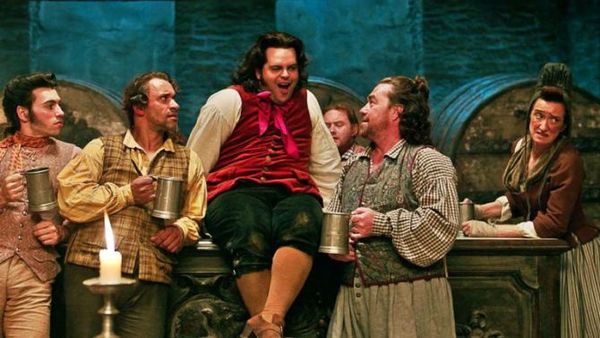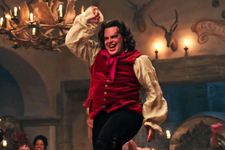 |
| LeFou has his say in Beauty And The Beast |
Oh my! Cover your eyes! Stop up your ears! And on no account take your children to see Beauty And The Beast which includes – whisper it low! - a gay character!
That's right: Disney, last bastion of all that is pure and American, has finally succumbed to homosexualist perversion. The buggers have breached the barricades, the sodomites are in the citadel. For in tribute to Howard Ashman, who was central to creating the original lyrics for Beauty And The Beast, but died before it opened, the producers of this remake have allowed LeFou, sidekick to the evil Gaston, one fleeting gay moment (we'll come back to that!).
 |
| Gaston: ""utterly evil, rapey, murderous" |
Or, as Ewan McGregor put it – perfectly - when an interviewer sought to erase the issue of LeFou's sexuality: “he’s a gay character. It’s 2017. For fuck’s sake.”
Still that has not stopped the anti-gay hysteria. Malaysia considered banning it, Russia has allowed it – but only to audiences aged 16 and over. Why am I not the least surprised?
For behind this banning and fretting and gnashing of teeth is a truth and a hypocrisy. The truth: despite rapid progress over the last 50 years, it remains, across large parts of the globe, a very dangerous thing indeed simply to be LGBT.
At the same time, things that it's not dangerous to be include violent, selfish and misogynist. Contrast the reaction to secondary character LeFou with the non-reaction to his Master, Gaston. Sure, Gaston is clearly the villain of the piece, so one expects him to be villainous. But it is the nature of his villainy that takes the breath away.
He wants Belle to be “his”. He'll woo her if he can but if she won't succumb willingly to his blandishments then he'll take her. Early on he discusses the “hunt” with LeFou, making it very clear he views women as just so much prey, valued only according to whether they are easy to catch or not-so-easy.
Later, as the action grows more heated, he is prepared to have an old man locked up if he fails to consent to handing his daughter over to him. Gaston, the slightly buffoonish war hero has transformed into something utterly evil, rapey, murderous. There is nothing remotely redeeming to him.
Perhaps this film gets away with it because Gaston is, after all, the villain, and so one expects him to be evil. Yet, as I have commented before, many mainstream film narratives are deeply troubling. The traditional romance encourages stalking behaviour, while trashing notions of consent. Bad male behaviour is regularly rewarded, with the only yardstick of propriety being whether or not the object (!) of desire eventually succumbs – no matter how many times they said no before.
 |
| The Beast seeks redemption |
Beauty and the Beast is open to similar criticism. Despite some slight nods in the direction of independence and agency, the re-versioned Belle is no feminist icon – in part, I suspect, because this is remake of a story that first saw the light of day in 1991. Then there is the awkward question of whether her relationship with the Beast is more than a scarcely disguised version of the Stockholm Syndrome: captive, dependent, she has little option but to fall in love.
I am not altogether convinced by that. It was a problem first noted by Howard Ashman when Disney was debating whether to shelve this project, and he solved it by making clear that the focus should be on the Beast's redemption. And sure, even that may be troubling to those who consider character to be essentially fixed; but I do believe in the capacity to change, and this is about personal journey and change as much as love.
That's why, despite being aware of the film's failings, I am a fan.
Which leaves one slightly contrary take, and one question.
For in addition to the much-touted gay moment there is an even more fleeting trans moment: at the height of the siege of the Beast's castle, three burly men are transformed suddenly, magically by Madame Garderobe through the addition of dresses, wigs and make-up.
Two gaze in horror at each other – and promptly run away. The third turns to camera and, with one arch look, clearly approves the result. And – unless I am mistaken – it is this individual who in the finale is the other half of LeFou's gay moment: a man who likes wearing dresses dancing with an effeminate man.
 |
| LeFou: gay and happy |
From an LGBT perspective there is much wrong here: not just the blending of trans and gay, but the caricature gay persona attributed to LeFou throughout. But hey! Disney has been caricaturing and simplifying masculinity, femininity and pretty much every other “-ity” since it began – so why expect better when it comes to gay-ity?
The question: why on earth the outcry about this film, this gay moment? Because as Disneyologists the world over will tell you, Disney is peppered with gay characters, some hidden, some less so: Frozen, for instance, includes a burly male shop-keeper who lets slip that he has a husband and kids!
Frozen, Maleficent and other recent films also include strong independent women and narratives that reject misogyny and heteronormative culture.
Yet it is LeFou's single moment – joining the celebrations at the end by dancing with a man - that has attracted all the outcry. And perhaps the truth is this. Hollywood has happily colluded with a film version of “don't ask, don't tell”: by all means be gay. But don't, yanno, be gay.
This in the end is the taboo breached by LeFou, coming out of the closet, demonstrating to one and all that it is possible to be gay and happy too. That, is the ultimate crime and one that the bigots will not quickly forgive.





















